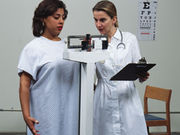Health Professionals View Insurance As Solution in Obesity
Fifty-seven percent perceive improved coverage as a solution to improve outcomes in obese patients
Pharmacogenetic Analyses Can Optimize Clomipramine Dosing
Case report of woman with depressive episode who did not respond to standard dose of clomipramine
Half of Americans Have at Least One Chronic Health Condition
Medical conditions, mental illness, and substance abuse problems often overlap
Psych Meds Rx May Cut Violent Reoffending in Ex-Prisoners
Medications used to treat addiction cut risk in half
October 2016 Briefing – Psychiatry
Here are what the editors at HealthDay consider to be the most important developments in Psychiatry for October 2016. This roundup includes the latest...
Intervention Improves Cognitive Symptoms in Cancer Survivors
Cognitive rehabilitation program can improve self-reported cognitive function through six months
Medicaid Policies Impact Use of Smoking Cessation Medications
Reduction in use with policies that require patients to obtain counseling; use up with increased coverage
Diabetes-Related Distress Ups Risk for Rx Nonadherence
Depression is independent predictor of adherence; reduces the effects of diabetes distress
Few Changes in Employer-Sponsored Insurance 2013-2014
Only 3.5 percent of employers dropped coverage and 1.1 percent added coverage from 2013 to 2014
Depressive Symptoms Linked to Functional Status in CAD
Patients with class II, III, or IV functional status have increased risk of hospitalization for heart failure



















